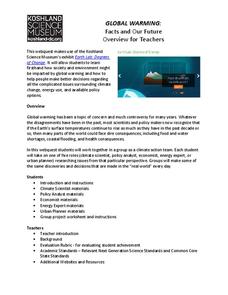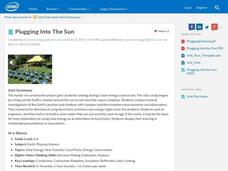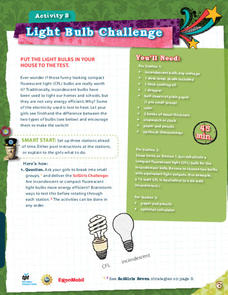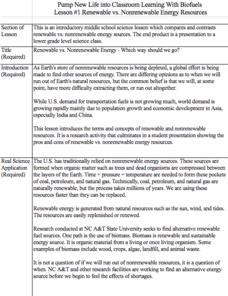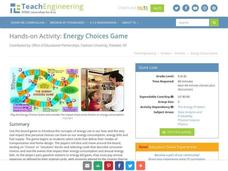California Academy of Science
Optimal and Sustainable: Renewable Energy Revamp
More than 100 cities around the world have shifted from fossil fuels to renewable energy sources. Scholars investigate a city wanting to make this switch, but needs help determining how to make the shift. Groups consider all options,...
National Academy of Sciences
Global Warming: Facts and Our Future
According to the United Nations, climate change affects every country on the planet. This research project encourages scholars to explore the factors that affect climate change from different perspectives: climate scientist, policy...
Intel
Plugging into the Sun
What's cooking? A sizzling STEM unit challenges scholars to build a solar cooker that can successfully cook an egg. The unit opens with a study of Earth's rotation, the sun's energy, and shadows. Pupils use a compass and thermometer to...
Teach Engineering
Introduction to Water Chemistry
What are the issues surrounding water quality? Viewers of this short presentation gain information about the importance of clean water, the lack of fresh water, water contamination, and ways that engineers treat water.
Environmental Protection Agency (EPA)
How Much Water Do You Use?
Incorporate reading strategies, math, research, and the scientific method into one lesson about water conservation. After reading a story about a landlady trying to determine how many people are living in an apartment, learners develop a...
Environmental Protection Agency (EPA)
The Case of the Mysterious Renters
Upper-elementary kids examine the water usage in their own home, then use that data to solve a case in which a landlady is trying to determine how many people are living in an apartment being rented. Combine math, scientific method, and...
Baylor College
Can Nutrients in Water Cause Harm?
Ecology candidates culture pond water organisms over a few days time, then they experiment to find out how increasing nutrients affects the population. As part of a unit on water, this exploration gives your class an understanding of how...
California Academy of Science
Global Climate Change and Sea Level Rise
Ice is nice, and its condition on the planet has a significant effect. Junior geoscientists experiment with ice melting in both water and on land to discover how each affect the rising sea level. This detailed lesson outline even...
Bonneville
Wind Energy
Let the wind take pupils to a new understanding of renewable energy. The fifth of seven parts in the A Community Powered by Renewable Energy unit has learners investigate wind energy. They find out why wind occurs, learn about windmills...
Bonneville
Home Energy Audit
Reduce energy consumption and save some money at the same time! The third of seven installments in the A Community Powered by Renewable Energy unit focuses on energy use in the home. Learners investigate the energy needs of small and...
PBS
Light Bulb Challenge
Efficiency equals money where homes are concerned. A comparative lesson asks learners to measure heat output of incandescent and compact fluorescent light bulbs. They follow their investigation with calculating the cost of using the two...
PBS
Going Green
Trash is where it's at! Using bags of garbage collected from the school, learners sort the contents into categories based on type of material and collect data on the results. The data may include weight, volume, and/or percent of the trash.
PBS
All Tangled Up
It is a tangled web the ecosystem weaves. Learners begin an activity on ecosystem interactions by building a food chain and then a food web with yarn as a group. To finish, they research local environmental changes that may impact the...
PBS
Star Power
Let there be light—or maybe not. Pupils learn about light pollution with an investigation of constellations. They create constellation boxes and experiment with different levels of light. Observations are then made about the lighting in...
National Wildlife Federation
Understanding and Measuring School Electronics
Feel the power in turning off electronics. Using energy-monitoring devices, pupils find the amount of energy it takes to power a simple electronic when it is on and when it is off. They then calculate the cost for the entire year for the...
National Academy of Sciences
Lights at Night Webquest
Help learners find ways to become more efficient energy consumers. To start, individuals research how different countries address energy efficiency and then analyze their own carbon footprint. They use their research to identify ways to...
National Wildlife Federation
Water, Water Everywhere?
Visibly display the location of the water in the world. Using 12 liters of water to represent the total amount of water in the world, the class measures out the water located in different areas, such as the ocean and ice caps. Class...
CK-12 Foundation
CK-12 Earth Science Concepts for Middle School
Explore a variety of science concepts in an interactive textbook created for middle school scholars. A lengthy table of contents takes readers to pages comprised of a subject overview, outline, and summary. Follow links further to find...
California Academy of Science
Food for Thought: Defining a Problem to Find a Solution
Scholars approach a problem trying to plan a meal for a class party. They learn about the restrictions and must decide what information they need to plan the meal. The first lesson in a 13-part unit on Our Hungry Planet encourages...
Kenan Fellows
Renewable vs. Nonrenewable Energy Resources
Is one type of energy inherently good or bad? Young scientists explore energy resources in a week-long unit. After extensive research, groups create powerful position statements and presentations supporting their energy resource of choice.
Howard Hughes Medical Institute
Ocean Acidification
Human impacts on the environment can sometimes be difficult to measure, especially under water! An activity centered on ocean acidification gives science scholars the opportunity to examine the effects of carbon dioxide on marine life....
Teach Engineering
Energy Forms, States and Conversions
Even magicians can't make energy disappear. In a discussion-based lesson plan, young scientists learn about energy forms and conversions. They see how energy is neither created nor destroyed; it just changes forms. This is the 11th...
Teach Engineering
Energy Perspectives
The data says ... the resource is great to use. Using Microsoft Excel, pupils analyze data from the US Department of Energy in the fifth lesson of a 25-part Energy Systems and Solutions unit. Each group looks at a different data set and...
Teach Engineering
Energy Choices Game
Here's a fun game on a very serious matter. Scholars play a board game to learn about personal energy use and consumption. They see how various choices affect their energy use and costs, and then apply this knowledge to brainstorm ways...



